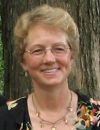- Members of Trinity Lutheran in Palmer, Alaska, harvest potatoes from the church’s community garden.
- Vegetables are harvested weekly and delivered to the local food pantry.
- Trinity member Shirley Platt prepares to spend the night in her cardboard home during Cardboard City, a national event to increase awareness of homelessness and to raise funds for local organizations.
When Lynn Hauger Anselm, a member of Trinity Lutheran Church in Palmer, Alaska, attended a four-day training in community organizing conducted by Anchorage Faith & Action Congregations Together (AFACT), she left feeling energized and inspired. She especially liked connecting with people from diverse geographic contexts and faith traditions.
Anselm said she participated because “these principles are in keeping with our congregation’s genuine concern for the surrounding community. It’s not a church that is content with simply catering to its existing membership.” This is what attracted Anselm to her congregation in the first place.
Trinity members like Anselm, along with their pastor Diane Krauszer, recently helped launch a faith-based community organizing effort in the Mat-Su Valley region of Alaska. They did so in partnership with 11 other churches of various denominations.
Since Trinity members are so new to community organizing, they’ve been focusing on working with a newly hired community organizer to put together their Local Organizing Committee (LOC). This team will help the congregation put the principles of organizing into practice for the sake of congregational vitality and renewed engagement with their community.
Krauszer said an organizing approach to ministry “means doing what Jesus wants us to do: [to] empower people, make life better for us and our neighbors, and build authentic relationships.”
So far members of Trinity’s LOC have conducted more than 40 one-on-one relational meetings, mostly with other members of the congregation but also with some residents. The issues cropping up in conversations have to do with inadequate housing, senior services, mental health resources and handicap accessibility at their church building. Next they plan to discern which issues they might be able to address. Then, as a congregation and with community partners, they will work to determine how best to take action, Krauszer said.
Anselm and Krauszer hope this effort will create a greater sense of vitality in the congregation. In a broader sense, Krauszer said she hopes people—members and neighbors alike—will recognize an alternate narrative about the church.
The current narrative tends to convey a restrictive, exclusive, judgmental attitude, she said. Instead, through congregation-based community organizing, Trinity hopes to bear witness to God’s abundance, inclusion, caring relationships and action for the greater good.







